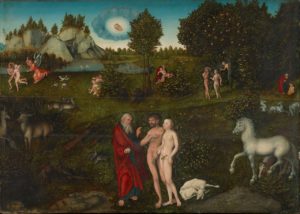Thoughts on Sunday’s Lessons for June 10, 2018

Garden of Eden (1530), painting by Lucas Cranach the Elder (1472-1553). In the foreground: Prohibition of God to Adam and Eve, in the middle ground: Creation of Adam, the Fall, Discovery of the Fall, the Expulsion from Paradise. Kunsthistorisches Museum, Vienna. (Click image to enlarge.)
First Reading (Track One): 1 Samuel 8:4-20,11:14-15
This reading may at first appear to be an obscure passage from Israel’s early history, but it marks a significant turning point: Having settled in the Promised Land under the guidance of judges (temporary military leaders), the nation now faced rising difficulties with corrupt judges, including the prophet Samuel’s own sons, who had taken bribes. The people clamored for a king to lead them in the manner of their neighboring nations. Samuel opposed this idea, declaring that God was Israel’s king. But with God’s direct guidance, Samuel finally gave in and named Saul king; but Samuel warned that the people would come to regret it.
First Reading (Track Two): Genesis 3:8-15
When Adam and Eve ate the fruit that God forbade, they suddenly realized that they were naked. Then they realized that they had defied God’s command. No wonder they were scared! They covered their bodies and hid. When God found them, they blamed each other, and they blamed the snake. What would have happened if they refused to take the fruit? Would the bible have ended just like that, Adam and Eve living happily ever after in Eden? But Adam and Eve did disobey God and lost their home in the garden. Bear in mind, though, that God came out of the garden with them, and stayed with a people of free will and belief through all the ages.
Psalm (Track One): Psalm 138
Even from on high, God cares for the lowly. This lovely Psalm of thanksgiving praises God and exults in gratitude that God stays with us when we are in trouble, and answers us when we call. In words that echo the familiar verses of the beloved 23rd Psalm, we remember that God keeps us safe even when we walk in the midst of trouble and that God’s strong hand protects us from our enemies.
Psalm: (Track Two): Psalm 130
We hear this Psalm of hope in God’s redemption now and then in Lent; and it is often chosen, albeit less frequently than Psalm 23, as a Psalm for use in the burial of the dead. Titled “De Profundis” (“out of the depths”), it reminds us that we wait in hope for God’s love and grace even in times of grief, pain and despair, . Even in death we await the resurrection, as in night’s darkest hours we wait for morning light.
Second Reading: 2 Corinthians 4:13-5:1
Do not lose heart, Paul tells the Christian community of Corinth, even though we may feel as if we are living a life of affliction and wasting away in our fallen world. That anguish is only momentary in God’s greater intent: God raised Jesus from the dead, and God will raise us, too, Paul writes. The pain that we feel today is only passing. Through God’s grace we will come to live forever in God’s glory beyond all measure.
Gospel: Mark 3:20-35
Last Sunday we saw Jesus rouse the anger of the Pharisees when he healed a man with a withered hand in the synagogue on the Sabbath. Now, accompanied by a huge, excited crowd that has been following him, he’s in trouble with his family and neighbors. The neighbors think Jesus has gone crazy, or is possessed by a demon, which in those times amounted to the same thing. His mother and brothers come out to talk to him, but his reply probably did not make his family happy: He tells them that his followers are his family now, with work to do in a broken world full of sinners.
What are “Track 1” and “Track 2”?
During the long green season after Pentecost, there are two tracks (or strands) each week for Old Testament readings. Within each track, there is a Psalm chosen to accompany the particular lesson.
The Revised Common Lectionary allows us to make use of either of these tracks, but once a track has been selected, it should be followed through to the end of the Pentecost season, rather than jumping back and forth between the two strands.
For more information from LectionaryPage.net, click here.
